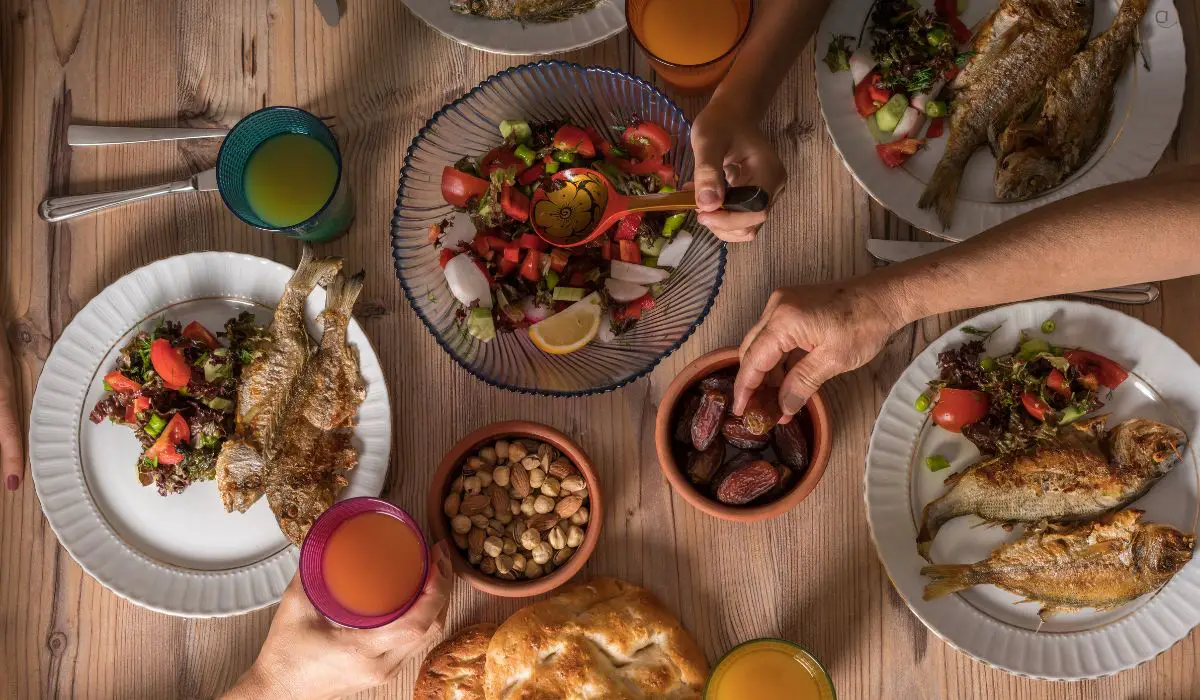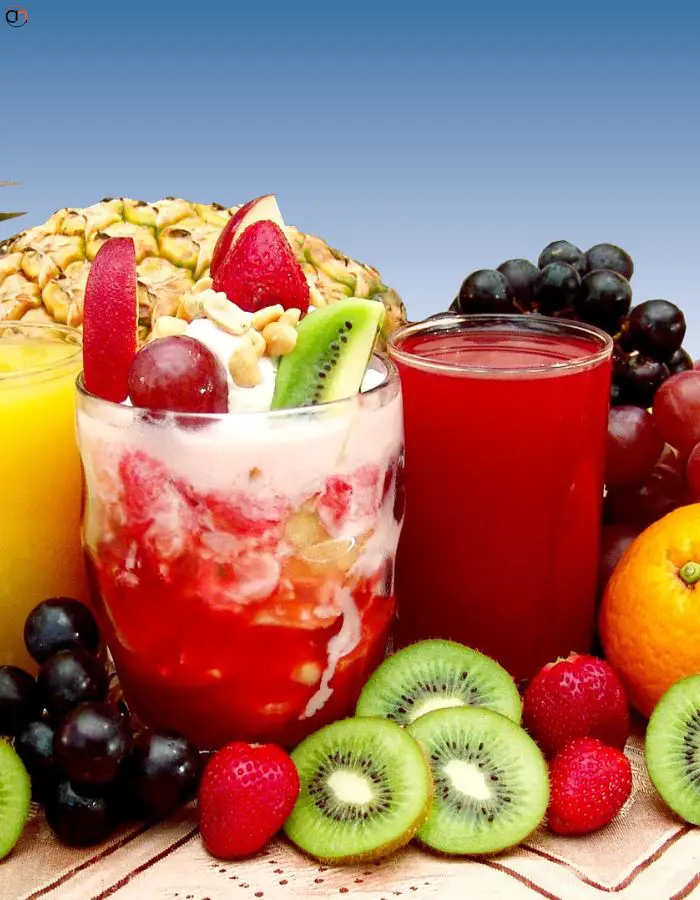What To Eat For Iftar

Iftar, the evening meal that breaks the daily fast during Ramadan, is a time for nourishment, reflection, and gathering with loved ones. After hours without food and water, it’s important to choose meals that replenish energy, hydrate the body, and provide essential nutrients.
A balanced iftar typically starts with dates and water, followed by wholesome dishes rich in protein, healthy fats, and complex carbohydrates.
From hydrating fruits and hearty soups to protein-packed mains and light desserts, the right choices can keep you energized throughout the night.
Get what to eat for iftar to promote health and sustain you for the next day’s fast & join us.
What to eat for iftar:
Many cultures have traditional foods that are eaten at iftar, and these choices are often backed by nutritional benefits. Here are what to eat for iftar and beneficial foods for breaking a fast:
1. Dates and Water – The Best Way to Break a Fast
One of the most traditional and recommended ways to break a fast is by eating dates and drinking water. Dates are rich in natural sugars, providing an instant energy boost after a long day of fasting. They are also packed with fiber, potassium, and magnesium, which help replenish lost nutrients. Drinking water alongside dates helps rehydrate the body, preventing dehydration and restoring balance.
2. Soups and Light Starters – Hydrating and Easy-to-Digest
Soups are an excellent first course for iftar as they are light on the stomach and help with hydration. Lentil soup, vegetable broth, and yogurt-based soups are popular options that provide essential nutrients without overwhelming the digestive system. A warm soup also prepares the stomach for the main meal, reducing the risk of overeating.
3. Fresh Fruits and Juices – Natural Hydration and Quick Energy
Fresh fruits such as watermelon, oranges, and apples are packed with vitamins, minerals, and antioxidants. Consuming fruits at iftar helps the body regain lost fluids and provides natural sugars for a quick energy boost. Natural fruit juices without added sugars, such as orange juice or coconut water, are also great for rehydration.
Main Course Options for a Healthy Iftar:
Once the body has adjusted to food intake, a balanced main course is important to maintain energy and keep digestion smooth.
1. Lean Proteins – Building and Repairing the Body
Including high-quality protein in your iftar meal is essential for muscle recovery and overall strength. Options like grilled chicken, baked fish, lentils, and beans are excellent sources of protein. These foods help keep you full and prevent muscle loss that may occur during fasting.
2. Complex Carbohydrates – Sustained Energy Release
Carbohydrates are the primary source of energy for the body. However, choosing complex carbohydrates over simple ones is key. Whole grains such as brown rice, quinoa, whole wheat bread, and oats provide long-lasting energy without causing sudden spikes in blood sugar levels. These foods also contain fiber, which promotes good digestion and prevents bloating.
3. Healthy Fats – Supporting Digestion and Fullness
Healthy fats from sources like olive oil, avocados, nuts, and seeds are beneficial for overall health and keep you full for longer. Cooking meals with moderate amounts of olive oil and adding nuts or seeds to salads can enhance the meal’s nutritional value. Avoid excessive consumption of fried foods, as they can lead to digestive discomfort and sluggishness.
4. Hydration and Drinks
Proper hydration is crucial for replenishing lost fluids after a full day of fasting. Here are some of the best drinks to include at iftar:
- Water: Drinking plenty of water is the best way to stay hydrated.
- Herbal Teas: Chamomile, mint, and ginger teas help with digestion and relaxation.
- Fresh Juices: Freshly squeezed orange juice, coconut water, or homemade smoothies provide hydration and nutrients.
- Buttermilk or Laban: These probiotic drinks aid digestion and replenish electrolytes.
Avoid: Carbonated drinks, processed juices with added sugars, and excessive caffeine, as these can cause dehydration.
5. Light and Nutritious Desserts
Many people enjoy having something sweet after iftar, but it’s important to opt for healthy desserts that won’t cause an energy crash. Some great options include:
- Fruit Salad with Honey: A naturally sweet and refreshing treat.
- Greek Yogurt with Nuts and Dates: Packed with protein and healthy fats.
- Chia Seed Pudding: A fiber-rich dessert that supports digestion.
Moderation is key when enjoying traditional sweets like baklava or kunafa, as these can be high in sugar and fats.
Tips for a Balanced Iftar:
To make the most of your iftar meal, follow these simple tips:
- Eat Slowly: Give your body time to process food to prevent overeating.
- Portion Control: Avoid overloading your plate with heavy foods.
- Include Fiber: Fiber-rich foods help prevent constipation and aid digestion.
- Stay Hydrated: Drink water consistently between iftar and suhoor.
- Plan Meals Ahead: Preparing a balanced meal in advance helps maintain healthy eating habits.
NOTE: Making mindful food choices ensures a healthy and fulfilling Ramadan experience.
If you enjoy traditional dishes or experiment with new meals, prioritizing nutrition will help you feel your best throughout the holy month.
Read Next: 10 Halal Food Ideas
FAQs:
Q. what to eat for iftar dinner?
The best food to break a fast is dates and water, as dates provide instant energy and essential nutrients while water rehydrates the body.
Q. Can I eat fried foods for iftar?
While fried foods are popular in iftar meals, they should be eaten in moderation as they can cause bloating and sluggishness.
Q. How can I stay hydrated after iftar?
Drink plenty of water, herbal teas, and fresh juices, and avoid sugary or caffeinated drinks that can lead to dehydration.
Q. What are the best protein sources for iftar?
Lean meats like chicken and fish, legumes such as lentils and chickpeas, and dairy products like yogurt are excellent protein sources for iftar.






